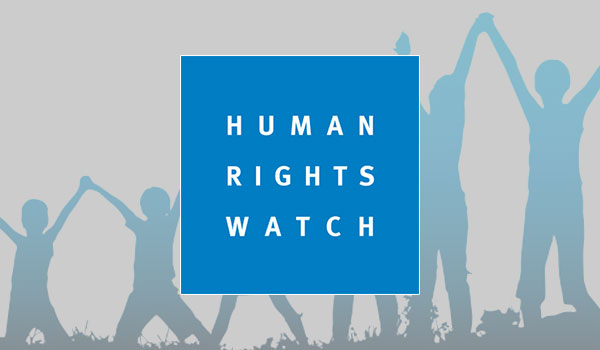Ensure refugees, asylum seekers safety – HRW

Human Rights Watch has called for the Sri Lankan government to take all necessary steps to ensure the safety of South Asian refugees and asylum seekers from violence. Human Rights Watch said Sri Lankan authorities, as part of broader measures to protect Muslims and other minorities, should ensure the safety of refugees and asylum seekers.
This, they said includes providing adequate protection to mosques, police stations, and other locations where refugees are staying, transferring them to safer areas, and working closely with humanitarian agencies providing assistance.
South Asia director Meenakshi Ganguly said Lankan authorities not only have a responsibility to apprehend those responsible for the heinous Easter Sunday attacks, but also to protect all those now at heightened risk. Ganguly said Sri Lankan authorities have a responsibility to arrest and prosecute all those involved in the Easter Sunday attacks and prevent further extremist violence.
A statement published on the HRW’s officials website said media and local activists reported that nearly a thousand refugees and asylum seekers were displaced after landlords came under local pressure to evict them. Many have sought safety at nearby mosques or at the police station in Negombo, the western coastal town where one of the deadliest church bombings occurred. The authorities were forced to cease efforts to relocate them to suitable neighboring areas with proper facilities because of protests from local communities. Activists reported that on at least four occasions, busloads of frightened migrants, including many children, older people, and others with special needs, traveling to safer areas had to return to the overcrowded Negombo police station.
Most of the primarily Pakistani and Afghan migrants are Muslim, but they also include Christians. Many, like the Ahmadis, fled to Sri Lanka due to persecution they faced in their own countries. Several hundred migrants are now staying at the Ahmadiyya mosque in Negombo, while others have been sheltered in a local school. Sri Lankan activists who have been struggling to help the migrants expressed concerns that local administrative officials and police had not acted promptly to protect them from angry crowds.
One activist reported on April 27 that 11 additional Afghan and Pakistani refugees were evicted from their homes in Negombo because of threats and pressure from local residents. About 30 members of the Iranian migrant community have been unable to leave their homes for fear of attack.
Hafza, a Christian from Pakistan, told the Daily Mirror: “I was cooking when a group of people arrived and shouted at us to leave. Then, the house owner said if we don’t leave, he would also be attacked by them. We just had to leave with our kids.” She said that after fleeing their home they joined a group going to a mosque for safety.
About 650 migrants have been at the mosque in Pasyala, 35 kilometers east of Negombo. Because of pressure from the local community, many there have sought help to move to the mosque in Negombo.
Ahmadiyya community members told the Associated Press that assailants had dragged them from tuk-tuks (auto rickshaws), hit them with sticks, or hurled stones. They said mobs had broken into homes. Their Christian landlords, police, or soldiers helped take them to the mosque for safety.
Tariq Ahmed, a 58-year-old Ahmadiyya man from Pakistan, told the Associated Press: “The people in Pakistan attacked us and say we’re not Muslims…. Then in Sri Lanka, people attack us because they say we are Muslims.”
Babar Baloch, a spokesman for the United Nations refugee agency (UNHCR), told the media that refugees reported being “the targets of threats and intimidation.” He said that: “UNHCR is working closely with local and national authorities who have been very supportive and helpful to ensure the security and safety of all refugees and asylum-seekers during this time of heightened anxiety and concern.” About 1,600 refugees and asylum seekers are registered with the refugee agency in Sri Lanka.
Under the UN Guiding Principles on Internal Displacement, the government has a responsibility to protect against “[a]cts of violence intended to spread terror among internally displaced persons” and ensure their “right to seek safety in another part of the country.”
The police have arrested about 100 people since the Easter Sunday attack and confiscated alleged bomb-making material and weapons. Sri Lanka’s abusive Prevention of Terrorism Act (PTA), which has long been used to detain criminal suspects without charge or trial, remains in effect, despite pledges in a UN Human Rights Council consensus resolution in October 2015 to repeal and replace the law. Suspects who are not brought promptly before a judge and given access to family members and legal counsel, as is common under the PTA, are at greater risk of torture and other abuse, Human Rights Watch said. All of those apprehended should be promptly brought before a judge and charged with a criminal offense or released.
“Sri Lankan authorities have a responsibility to arrest and prosecute all those involved in the Easter Sunday attacks and prevent further extremist violence,” Ganguly said. “But as Sri Lanka’s civil war history makes clear, doing so without ensuring basic rights will be counterproductive. Fostering cooperation by all of the country’s religious and ethnic groups is crucial for the safety of all.”

Latest Headlines in Sri Lanka
- Court of Appeal to rule on IGP Tennakoon’s arrest warrant on March 17, 2025 March 12, 2025
- Military deserter arrested for sexually assaulting doctor at Anuradhapura Hospital March 12, 2025
- Tuition teacher under investigation for student assault ignores NCPA summons March 12, 2025
- Sri Lanka maintains stance on Adani, open to investment March 12, 2025
- Doctors strike over delay in arrest of sexual assault suspect March 12, 2025



Please accompany them appropriate countries which Human Rights Watch want..no need to maintain in sri lanka